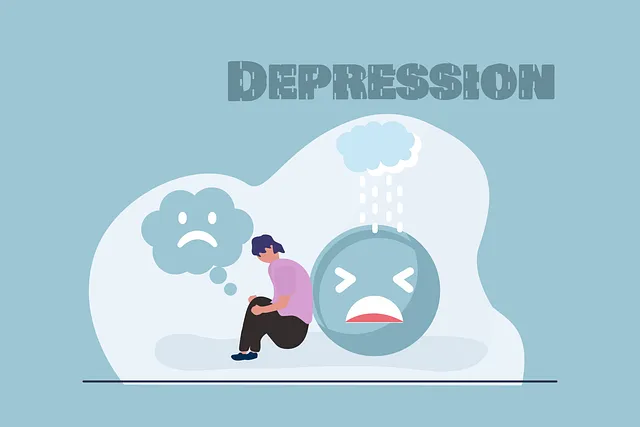The text emphasizes the importance of stress management in healthcare settings, highlighting that chronic stress leads to burnout and harms mental and physical health. Broomfield Kaiser Permanente's behavioral health services reviews underscore the need for stress management among providers, focusing on causes, impacts, and effective techniques. Interactive activities, mindfulness exercises, visual aids, and group discussions are recommended for teaching resilience and understanding. Key findings from these reviews include the positive impact of conflict resolution techniques and regular assessments for continuous improvement, crucial for preventing burnout and enhancing overall well-being in healthcare institutions.
Stress management techniques are essential tools for navigating today’s fast-paced world. This article explores comprehensive stress management teaching, drawing insights from Broomfield Kaiser Permanente behavioral health services reviews. We begin by examining the foundational understanding of stress and its profound impact on overall well-being. Subsequently, practical strategies and engaging learning methods are presented to empower individuals in managing stress effectively. Finally, we delve into successful implementation and evaluation approaches based on real-world examples from Broomfield Kaiser Permanente.
- Understanding Stress and Its Impact: A Foundation for Teaching Effective Techniques
- Practical Tools and Strategies: Engaging Students in Learning Stress Management
- Implementing and Evaluating Stress Management Programs: Insights from Broomfield Kaiser Permanente Behavioral Health Services Reviews
Understanding Stress and Its Impact: A Foundation for Teaching Effective Techniques

Stress is a complex psychological and physiological response to demands placed on an individual. It can stem from various sources, such as work pressure, personal relationships, or financial concerns. At its manageable levels, stress can motivate individuals to perform at their best; however, chronic or prolonged stress can lead to burnout and negatively impact both mental and physical health. This is particularly relevant in healthcare settings where staff often face high-stress situations on a daily basis. For instance, reviews of Broomfield Kaiser Permanente behavioral health services highlight the importance of addressing stress management among healthcare providers to enhance job satisfaction and patient care outcomes.
Understanding the root causes of stress and its impact on individuals is crucial when teaching effective stress management techniques. This knowledge forms a solid foundation for developing strategies aimed at burnout prevention, such as those employed in Burnout Prevention Strategies for Healthcare Providers. Public Awareness Campaigns Development and Community Outreach Program Implementation can also play significant roles in fostering healthier coping mechanisms and promoting resilience among stressed individuals. By equipping people with the right tools to manage stress, we contribute to creating a more resilient community capable of navigating life’s challenges effectively.
Practical Tools and Strategies: Engaging Students in Learning Stress Management

Teaching stress management techniques to students is a powerful way to empower them with lifelong skills for emotional well-being promotion. At Broomfield Kaiser Permanente behavioral health services, we’ve found that engaging students in learning these strategies can significantly contribute to their overall resilience building. One effective approach involves incorporating interactive activities and real-life scenarios into the curriculum. For instance, role-playing can help students practice healthy communication techniques when dealing with stress triggers, enhancing their emotional regulation skills.
Additionally, visual aids, group discussions, and mindfulness exercises can make the learning process dynamic and accessible. By combining these practical tools and strategies, educators create an environment that encourages active participation and fosters a deeper understanding of stress management concepts. This hands-on approach not only helps students identify effective coping mechanisms but also equips them with the resilience needed to navigate challenging situations, as reviewed by numerous Broomfield Kaiser Permanente behavioral health services clients.
Implementing and Evaluating Stress Management Programs: Insights from Broomfield Kaiser Permanente Behavioral Health Services Reviews

Implementing and evaluating stress management programs is a crucial aspect of holistic healthcare, as evidenced by Broomfield Kaiser Permanente behavioral health services reviews. These reviews highlight the importance of tailored interventions to address the unique needs of individuals within an organizational setting. By examining employee feedback and outcomes, institutions can identify effective strategies for burnout prevention and enhance overall well-being.
One notable finding from these evaluations is the positive impact of conflict resolution techniques on stress management. Incorporating such skills into workplace training programs has shown promising results in reducing interpersonal tensions and promoting healthier communication. Additionally, these reviews underscore the value of regular assessments to gauge the success of implemented strategies, allowing for continuous improvement and refinement of stress management initiatives.
Stress management techniques are valuable tools that can greatly enhance students’ well-being and academic performance. By providing a comprehensive understanding of stress, its causes, and impacts, educators can empower students with effective coping strategies. The implementation of stress management programs, as highlighted by the Broomfield Kaiser Permanente behavioral health services reviews, demonstrates significant benefits for student mental health. Through practical tools and engaging strategies, teachers can foster a supportive learning environment, enabling students to navigate stress and thrive academically.






